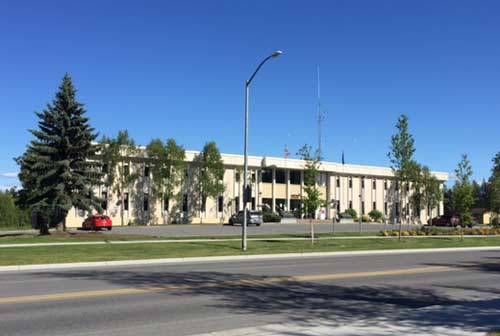Editor’s note: This article has been updated to include the date of the oral argument at the Superior Court of Alaska in Anchorage.
A year after a lawsuit was first filed against the Kenai Peninsula Borough over the assembly’s invocation policy, the court is set to hear the two sides’ final arguments.
The attorneys for the plaintiffs and defendants have been filing motions in the Superior Court of Alaska in Anchorage back and forth for almost a year, moving first to U.S. District Court and then back to state court with multiple attorneys representing both parties. A trial call is scheduled for Feb. 12 and a trial scheduled for Feb. 26, according to Courtview.
The American Civil Liberties Union of Alaska filed the lawsuit in December 2016 after the Kenai Peninsula Borough Assembly passed and refused to amend a policy requiring anyone giving an invocation before its meetings to be either a member of an organization with an established presence in the borough that meets regularly for the primary purpose of exchanging religious views, or a chaplain serving the military, law enforcement agencies, fire departments, hospitals or other similar organizations. The ACLU argued that the policy was discriminatory, blocking those who were not members of established religious organizations the right to give an invocation.
However, it may not go to trial at all. The primary attorney defending the borough, Anchorage-based attorney Kevin Clarkson, filed a motion for partial summary judgment on three of the four counts, and a request for oral argument. He said the borough intended to come back and address the fourth claim eventually, but the ACLU took them all on in one motion before they could.
“(Three of the claims) seem to be related from the borough’s perspective,” Clarkson said. “Really, the only question should be is there a violation of the establishment clause.”
The fundamental disagreement is over whether the borough’s institution of the invocation policy is a violation of the establishment clause, the legal term referring to the mandate in the Constitution banning the government from establishing an official religion or favoring one religion over another. The borough has argued that the policy is technically open to everyone as long as they pass the basic requirement of being part of a group that meets regularly. The ACLU argued that this violated the rights of individuals who chose not to be part of officially recognized and organized religious groups. The three plaintiffs in the case fit the bill — all three asked to give an invocation before the assembly and were denied because they were not part of established groups.
A summary judgment can be granted when neither party disagrees about the facts of the case, said Eric Glatt, the attorney on the case for the ACLU.
The ACLU opposed the borough’s request for summary judgment on those claims and cross-filed a motion for summary judgment of its own applying to all four charges. The borough filed a response on Jan. 17, after which the judge can schedule the oral argument.
“The actual court appearance would be probably done in less than an hour and a half,” he said. “Each side would have some time to speak, and the judge would have time to ask questions.”
Clarkson said the borough expects state courts to interpret the establishment clause consistently with the federal interpretation. The Alaska Supreme Court has not taken on an establishment clause case based on its own law, and if it ruled against the borough, it would be in contrast to the state’s constitutional convention practices, he said.
“(It would) be tough to rule it as unconstitutional, because the Alaska constitutional convention was opened every day with a prayer, a uniquely Christian prayer,” he said. “… Basically, they would have to interpret the Alaska Constitution (to say) that the people who wrote the constitution were violating it.”
If the judge decides against the borough, the assembly will have to repeal or amend its invocation policy. The policy is still the subject of public comments and discussion, though all official assembly debate over it has been on hold since May. Assembly member Willy Dunne sponsored an ordinance to remove the invocation entirely, which the assembly defeated on a 6-3 vote in March. In April, the assembly voted down another resolution, again sponsored by Dunne, that would have required a number of other changes for the invocations to be delivered before the assembly meetings.
Most recently, a Homer-area man established a church in large part as an answer to the assembly’s invocation policy. Barrett Fletcher of McNeil Canyon describes himself as “the reluctant pastor of the Lower Peninsula Church of Pastafarians.”
He said the assembly’s invocation practice has bothered him for all 30 years he lived on the Kenai Peninsula and that after controversy erupted following a Satanic Temple invocation delivered by Iris Fontana of Kasilof, he said he intended to establish his own Satanic Temple chapter in the area but found it very difficult because of the organization’s rules. At the same time, he’s been following the international Church of the Flying Spaghetti Monster, a church established in 2005 in answer to a Kansas State Board of Education policy.
“The rules of the borough they put in after (Fontana’s invocation) is they’re forcing us to have an organization, so we’ve done it, and it’s been kind of fun,” Fletcher said.
Fletcher applied to Assembly President Wayne Ogle to give the invocation at the assembly’s meeting in Homer in September 2018 but was denied because the church had not yet met. Now that they have, he said he plans to go back to Ogle and request reconsideration.
He said he’d prefer the assembly drop the invocation altogether.
“It’s quite rare nowadays for government bodies to have an invocation,” he said. “There’s no reason to start the meeting with offending everyone.”
The oral argument for Hunt v. Kenai Peninsula Borough is currently scheduled for April 11 at 3:30 p.m. in Anchorage.
Reach Elizabeth Earl at elizabeth.earl@peninsulaclarion.com.


